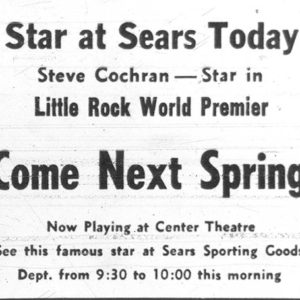calsfoundation@cals.org
Come Next Spring
Come Next Spring was a 1956 dramatic feature film produced and distributed by Republic Pictures Corporation. The film is about the reconciliation of a rural, Prohibition-era Arkansas family split apart by alcohol abuse. Both the original story and screenplay were written by Montgomery Pittman, whose family connections, and possibly childhood experiences, in Independence County, Arkansas, are referenced obliquely throughout the film.
The film premiered at the Center Theater in downtown Little Rock (Pulaski County) on February 1, 1956. The premiere included a personal appearance by one of the film’s stars, Steve Cochran. Released nationally in the United States the following month and internationally afterward, the film played in U.S. theaters well into 1957 and, in subsequent years, was broadcast many times on television.
The film’s cast included in lead roles Cochran, Ann Sheridan, and Pittman’s step-daughter Sherry Jackson, with veteran character actors Walter Brennan, Edgar Buchanan, Sonny Tufts, and others in supporting roles. Robert G. “Bud” Springsteen directed, and Herbert J. Yates produced the film. Academy Award winner Max Steiner scored the film. The title song, composed by Steiner with lyricist Lenny Adelson, was arranged by Percy Faith and performed by Tony Bennett and Margie Rayburn. Columbia Records released Bennett’s version of the song as a single in 1955.
Pittman wrote the screenplay for Cochran, his close friend, but Sheridan received top billing in the film. It marked her return to filmmaking following a lengthy hiatus and was one of the last films she made before retiring from motion pictures in 1957. She and Cochran regarded the film as an opportunity to rehabilitate acting careers impeded by typecasting.
Some newspapers and trade publications reported that Cochran himself, whose independent production company, Robert Alexander Productions, sold the script to Republic, was scouting northeastern Arkansas locations with the intention of filming scenes in the state; a few erroneous reports circulated that filming was done in the state. That may have been intended, but the movie actually was filmed in and around the small town of Ione, California, near Sacramento, during the summer of 1955.
In the film’s opening scene, a narrator informs the audience that “this story takes place in Arkansas,” specifically in the vicinity of fictional Cushin—perhaps a variant of Cushman (Independence County)—beginning in the summer of 1927. Matt Ballot (Cochran) had abandoned his wife Bess (Sheridan) and daughter Annie (Jackson) for a cross-country drinking binge following an automobile accident that he caused while driving under the influence. Overcome by both remorse for what happened and wanderlust, he left. After renouncing alcohol, he returns unexpectedly nine years later to visit them. He discovers that he also has a son, Abraham. Since Bess did not answer the letters he sent during his long absence, he was unaware of her pregnancy and his son’s birth. Annie is mute, her inability to speak resulting from emotional trauma stemming from her involvement in the automobile accident Matt had caused.
After Matt’s return, despite initial misgivings and mistrust of Matt’s ability to stay sober, Bess lets him stay on as a hired farm hand for the children’s sake, not wanting to deprive them of their father’s presence. The community shares Bess’s wariness of Matt. He must prove to the townspeople that he has truly reformed before they will accept him, which they eventually do after a series of incidents in which he demonstrates previously uncharacteristic virtues of responsibility and self-restraint. In time, Bess’s own resentment and suspicion begin to subside, and the couple’s dormant love for each other awakens.
Because of Annie’s muteness and her father’s tarnished reputation, the local children treat her as an outcast, ridiculing and tormenting her, and causing her to withdraw from social interaction and seek companionship from animals. Learning that her beloved dog may have left a litter of puppies near hazardous abandoned mining properties on nearby Echo Mountain, Annie goes there to find them and bring them home, unknown to Matt and Bess until the next morning when they discover she is missing. They organize a search party. Meanwhile, Annie stumbles and begins to slide down a rugged hillside, breaking her fall by grabbing hold of a small tree branch. A scream, the first sound she has uttered in nine years, alerts the searchers, who find her dangling from the hillside. Matt, aided by a rival for Bess’s affections who had taunted him since his return and with whom he had fought just the night before, ties a rope around his waist, descends the hillside, reaches Annie, and rescues her. After the crisis is averted, they all realize that it was Annie who had screamed; she had regained her voice.
The film underperformed at the box office despite optimistic expectations and generally favorable reviews. It has been suggested that Republic, which was struggling at the time, did not promote it adequately.
When the film was released, Alex H. Washburn, co-owner, editor and publisher of the Hope Star, effused that the film was “the greatest tribute to Arkansas ever done in words or pictures.” Acclaimed film director Martin Scorsese, an admirer of the film, later offered a more measured assessment that it was a “very good movie.”
For additional information:
Come Next Spring. YouTube. https://www.youtube.com/watch?v=1-LfzUyw1jM (accessed October 5, 2018).
“Come Next Spring.” Internet Movie Database. http://www.imdb.com/title/tt0049088/ (accessed October 5, 2018).
“Come Next Spring.” Turner Classic Movies. http://www.tcm.com/tcmdb/title/71281/Come-Next-Spring/ (accessed October 5, 2018).
Greg A. Phelps
Lindsey Wilson College
 Divergent Prosperity and the Arc of Reform, 1968–2022
Divergent Prosperity and the Arc of Reform, 1968–2022 Come Next Spring Ad
Come Next Spring Ad 




Comments
No comments on this entry yet.